The Future of Feminism
January 9th, 2014 // 9:00 am @ Oliver DeMille
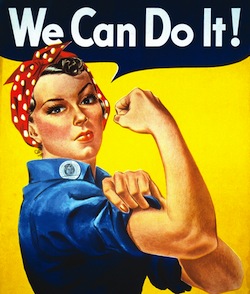 It could be over. The whole, centuries-long debate between men and women, as well as between women and women, over the best role for women, may be coming to an end.
It could be over. The whole, centuries-long debate between men and women, as well as between women and women, over the best role for women, may be coming to an end.
Ironically, this hinges not so much on women or men, but on both. And on children too.
Let me explain.
Feminism has progressed through several phases in history.
- First, women demanded voting and other basic equality with men.
- Second, they argued for the basic intrinsic equality of both genders.
- Third, they sought legal equality in the Equal Rights Amendment era.
All of these strategies made sense to men and women, even those who disagreed with the various leaders and agendas of feminism. After all, the idea of seeking equitable treatment and rights is basic to most Americans.
But at some point, starting in the 1980s, feminism took several interesting, and surprising, turns. Most men were shocked by the intensity of the woman vs. woman debate between those who argued that all women should have full-time careers and those who felt that such a choice was a downgrade for women, that their best work was done in the home.
This was followed by the “We Can Have It All” era, where many young women idealized having both full-time careers and all the benefits and rewards of full-time homemaking. One side said this was the ideal, another side argued that this was a mere illusion.
And finally, in the most recent evolution of feminist debates, dubbed “The Mommy Wars” by the media, some promoters of women in careers and some who believe that homemaking is the female ideal faced off in increasingly tense and extremely strong language.
By this point in the dialogue, men were basically left out of the conversation. National reports showed that more women than men are in college, and that men’s financial outlook is in decline while the earning future for women is bright.
Feminism was still a passionate topic, but the battling sides were made up almost exclusively of women.
That brings us to today. We now seem to be entering yet another major era of this discussion, but this time men are back in the conversation. They are front and center, in fact.
Women are increasingly talking about what men should, or shouldn’t, be. The idea seems to be that if men would just get their act together, many of the modern problems faced by women would be solved.
Like past battles, this one tends to anger almost everyone who thinks about it. One side makes the case that women are better off just living independently. They can have men in their life, if they choose, as long as they don’t become dependent on a man.
In fact, this view seems to accept that men will come and go, and that ultimately a woman has herself, her education and career, and a few close (women) friends that she can really depend on.
Her battles, in this narrative, are against enemies and frenemies, who are nearly always other women — not against men.
This worldview shows up in numerous recent movies and a host of articles in women’s magazines. Watch popular women’s talk shows, and this perspective is nearly always accepted as a fundamental — and undebatable — assumption.
On the other side is a growing view that men and women are very different, that each should fully engage their differences, and that both are happiest when this occurs.
As I said, this is ruffling feathers wherever the new view is shared.
Many women who agree with the historical goals of feminism — and men who view themselves as enlightened, modern, sensitive males — find this newly popular perspective corrupt, positively medieval, and above all, baffling.
Perhaps the most disturbing thing about this new era of discussion about men and women is that the majority view (the “Independent Woman”) patently refuses to even entertain the growing new perspective (“Real Men/Real Women”).
It is similar to when feminism first began, and men just ignored it, discounted it, or perhaps even laughed at it. This is how the current majority Independent Woman crowd is treating the growing Real Man/New Women minority.
In case you haven’t yet heard this new perspective, it goes something like this:
- Men are happiest when they are deeply involved in a chosen life mission that centers around their deepest interests and passions, their life purpose.
- Women want just such a man; anything less is a letdown to them.
- Men want a woman who will support them in this purpose and help them achieve it.
- Women are happiest when they are helping a man who is deeply engrossed in such a life mission, and raising sons who will someday pursue just such a mission and daughters who will help a man do this as well.
For the Independent Woman crowd, the Real Man/Real Woman view sounds a lot like a modern return to the worst elements of old-style patriarchy, the very reason that feminism was invented.
But as feminism proved, just ignoring this growing minority perspective isn’t going to make it go away.
A lot of people, both men and women, swear by this rising view. For them, women are equal to men, and should have all the same opportunities in education and work. And the happiest equal men and women, they maintain, follow these simple guidelines.
Men want a woman who above all wants to support him and raise a family, and women want a man who gives his life to a central purpose and raising a family.
If a man doesn’t have a life mission, a great purpose, he isn’t going to be very happy. And his woman won’t be very impressed with him. Neither will she feel valued or fulfilled in a marriage if her spouse does not depend on her to help in a real, important purpose.
This is the immediate future of feminism, the debate between the Independent Woman viewpoint and the Real Man/Real Woman perspective. Like I said, this is making a lot of people angry.
On the humorous side, this really is a return to the beginning of the whole debate about feminism. The first shall be last and the last shall be first, I guess.
But there is one big difference this time: the Independent Woman crowd is in the majority — at least in the media, academia, government, and other centers of pop culture.
How this difference impacts the debate remains to be seen.
Just to be clear, I agree with the Real Man/Real Woman side of this argument. I’m just fine with men or women being fully independent. I think we should all have the freedom to choose what we want, and the fact that my daughters (I have 5) have as many options as my sons makes me very happy.
I also think that the happiest men are passionately focused on a great life purpose, and the happiest women are married to such men — where they help each other in the most important parts of life.
Are they equal? Of course. Are they different? Of course. Should this be used as an excuse for men to control women, or for women to control men? Of course not.
But here’s the real problem: Our modern society is structured by the elitist class to convince the rest of us not to engage a central life mission or purpose. We are taught to get an education that will give us a job, a career, working for corporations and institutions run by the upper class. We are taught that our great life passions and interests are at best hobbies.
We are taught that well-paid professional drone work is the ideal — for men and for women. We are taught that children should be trained in schools run by the policies of elitists, seeking the goals outlined by elitists for those in the middle and lower classes.
This message is being taught in nearly every school in modern America. It is being promoted from Hollywood, and encouraged by Madison Avenue. It is being increasingly regulated and enforced from Washington.
Worst of all, more and more parents teach this message to their kids: “Get good grades, get into a good college, get a good career, and spend most of your adult hours working for someone else’s profit and power. This is the key to a happy life.”
As long as this lie dominates our society, a majority of men and women are going to miss out on real life. That’s the future of feminism, manhoodism, childhoodism, socialism, and capitalism.
It’s a serious problem.
For men, women, and children.
And the only thing that has any chance of changing it is Real Man/Real Woman ism. Real Men and Real Women find a great life purpose and give their all for it. And, where possible, they do this together. This is the key to a happy life.
That’s where I stand. I hope you do too.
 Oliver DeMille is the New York Times, Wall Street Journal and USA Today bestselling co-author of LeaderShift: A Call for Americans to Finally Stand Up and Lead, the co-founder of the Center for Social Leadership, and a co-creator of TJEd.
Oliver DeMille is the New York Times, Wall Street Journal and USA Today bestselling co-author of LeaderShift: A Call for Americans to Finally Stand Up and Lead, the co-founder of the Center for Social Leadership, and a co-creator of TJEd.
Among many other works, he is the author of A Thomas Jefferson Education: Teaching a Generation of Leaders for the 21st Century, The Coming Aristocracy, and FreedomShift: 3 Choices to Reclaim America’s Destiny.
Oliver is dedicated to promoting freedom through leadership education. He and his wife Rachel are raising their eight children in Cedar City, Utah.
Category : Blog &Culture &Current Events &Family &Generations &History &Politics
The Death of The Middle Class
July 19th, 2013 // 10:51 am @ Oliver DeMille
Columnist Joe Klein said on The Chris Matthews Show:
“This is the biggest problem that we’re facing going forward. We were a homogenous, middle class country, by and large, for the fifty years after World War II.
“Now we’re no longer homogenous, and there’s a good aspect to that in that we have become a true multiracial country. But there’s a bad aspect to that, in that the middle class, which was the heart of this country, is beginning to fracture, and to panic, in many ways.
“And unless we figure out a way to find jobs for the vast middle class in this country, it’s going to be really hard to sustain democracy. We now have a plutocracy in this country.”
This is exactly true, and many Americans feel Wall Street and Washington are working together against the middle class.
Worse, many people aren’t sure that any solution is ahead.
Many experts suggest that education can solve the class divide, but the people realize that most schools are actually increasing the gap between elites and the rest.
Modern schooling has become a huge part of the problem, not a solution.
The only real solution is a widespread shift from the employee mentality to entrepreneurship.
As David Ignatius points out, many immigrants to America see the United States as a great place to start businesses.
Sadly, most native-born Americans are afraid of entrepreneurship and feel that jobs should be plentiful—as if it were a birthright.
The future of American freedom hinges on this question: will the current generation of Americans embrace entrepreneurialism, or will we keep whining about Washington while waiting for more jobs to somehow appear?
Is the American spirit dead, or is free enterprise still one of our greatest American traditions?
Only the regular people can make this choice.
***********************************
 Oliver DeMille is the chairman of the Center for Social Leadership and co-creator of Thomas Jefferson Education.
Oliver DeMille is the chairman of the Center for Social Leadership and co-creator of Thomas Jefferson Education.
He is the author of A Thomas Jefferson Education: Teaching a Generation of Leaders for the 21st Century, and The Coming Aristocracy: Education & the Future of Freedom.
Oliver is dedicated to promoting freedom through leadership education. He and his wife Rachel are raising their eight children in Cedar City, Utah.
Category : Aristocracy &Blog &Business &Citizenship &Culture &Current Events &Economics &Entrepreneurship &Featured &Leadership &Producers
A Surprising Choice by America’s Founders
July 18th, 2013 // 10:48 am @ Oliver DeMille
 One of the most surprising events in the American founding occurred when the Continental Congress used the word “happiness” in the Declaration of Independence.
One of the most surprising events in the American founding occurred when the Continental Congress used the word “happiness” in the Declaration of Independence.
Up to that point, it was not a word often utilized in great political writings.
Words like “justice,” “liberty,” “property,” “honor,” “power,” “rights” and others were expected in such a document.
But “happiness” was not.
George Washington expressed the American perspective when he said, “the United States came into existence as a nation, and if their citizens should not be completely free and happy, the fault will be entirely their own.”
In this view, a good government protects people’s freedom, and what they do with it is up to them—and determines their happiness.
Still, the very idea that governments are instituted among men to do just this (protect a person’s right to pursue happiness), was a significant thought.
It was certainly not the view of the European aristocrats, who believed that happiness required financial means and the comforts of leisure time and was only meant to be enjoyed by a few.
The American founding generation took a different view.
They believed that happiness was the result of enterprise, and was possible for everyone.
This is a patently American perspective, and it provided a foundation for the whole American freedom experiment.
It is a profound idea.
If happiness is the result of individual actions and choices, then it follows that government’s primary role is to protect the right to act and choose.
Indeed, in such a view, the only purpose of government and law is to keep any person from taking these rights from anyone else—or of enforcing restitution if such protection fails.
This is the proper role of government: to protect inalienable rights (defense), and if this fails to cause restitution (justice).
This was the crux of the American system, the only one that could really be adopted if the goal of government was to protect “life, liberty and the pursuit of happiness.”
In ancient Rome, the Stoics argued that virtue is the cause of happiness, and this same view was promoted by ancient Judaism and early Christianity.
In feudal times, the meaning of happiness switched more to “good fortune,” which took it out of the hands of each individual.
By 1600, however, this was refined to mean “a pleasant and contented mental state.”
The American founding generation added to the meaning of “happiness” with the idea of voluntarily doing important things—from personal morality to economic enterprise, to family relationships, political and military sacrifice, and charitable service.
They also connected these same things to the concept of freedom, thereby forever linking the words “freedom” and ‘happiness.”
This bears repeating, because it is a central foundation of American government, but has been mostly forgotten today.
Specifically, the American founders put forward an amazing new view of government:
The proper role of the government is to protect inalienable rights, and to leave everything else to the people—who will increase or lose their liberty and happiness according to their personal virtue, economic enterprise, family relationships, charitable service, and other voluntary choices.
For the Founders to adopt this view was a remarkable and vitally important turn of world events, and it established a whole new view—and era—of freedom.
To a large extent, we have now lost this view, and our freedoms have decreased with this change.
We now follow the more traditionally European perspective that great changes in society come from the upper class, experts, elections, and government officials and policies.
The Founders disagreed.
They believed that the American Founding was the result of the people, not a few great leaders.
As John Adams responded when someone tried to compliment his role in the founding: “Don’t call me ‘Godlike Adams,’ ‘The Father of His Country,’ ‘The Founder of the American Republic,’ or ‘The Founder of the American Empire.’ These titles belong to no man, but to the American people in general.”
Freedom and happiness are always connected, and they are always up to the regular people, whether they realize it or not.
To the extent that freedom is declining, it is the fault of the regular people.
Our freedoms and happiness are up to us.
If freedom is in decline, we aren’t doing enough.
The good news is that the people have the power to do something about it, no matter how much the experts try to convince us otherwise.
***********************************
 Oliver DeMille is the chairman of the Center for Social Leadership and co-creator of Thomas Jefferson Education.
Oliver DeMille is the chairman of the Center for Social Leadership and co-creator of Thomas Jefferson Education.
He is the author of A Thomas Jefferson Education: Teaching a Generation of Leaders for the 21st Century, and The Coming Aristocracy: Education & the Future of Freedom.
Oliver is dedicated to promoting freedom through leadership education. He and his wife Rachel are raising their eight children in Cedar City, Utah.
Category : Blog &Citizenship &Culture &Featured &Government &History &Leadership &Liberty
Summer Reading for YOU
June 14th, 2013 // 10:56 am @ Oliver DeMille
5 Recommended Books for the Summer
by Oliver DeMille
“Dad, can you read to me more?” Meri asked me.
Surprised, I looked up from my book and responded, “Oh, sure.”
I took the book she was reading and read a chapter aloud to her. When I finished, I handed her the book.
“Thanks, Dad,” she said. “I could have read it myself, but I just love it when you read. I mean, in the winter you read to us a lot, and with all our classes and other activities it seems like I learn a lot from you, and all my other teachers.
“In the summer is when Mom reads to us the most, out on the couch on the porch, but I don’t learn as much from other people, and it seems like you don’t read to us as often.”
Meri walked away with her book, but our little conversation got me thinking. I’ve always taught that winter is the key time for family reading. But I think that summer is the most important time for kids to see their parents reading—mainly because they tend to spend less time on official “schooling” activities and more relaxed time with parents (and observing their parents’ leisure activity choices) during the summer months.
When children and youth see their parents reading a lot, they naturally value reading. When children and youth value reading, they read more.
Our choices during summer to make a huge difference in the education of our kids, and one of the most impactful things a parent can do is set the example of reading. If your kids see you reading books a lot, especially during summer leisure, not only are you filling your bucket of ideas and resources, but the example you set can drastically influence them. Reading is powerful!
On the national scale, all free societies are reading societies, and reading starts in the home!
Here’s a great summer reading list* that I’m following. I’m making sure all my children and youth see me reading these books this summer. And I’m really going deep—by reading with a highlighter and pen, taking notes and marking quotes as I go. I’m sharing these books because I hope you’ll do the same:
The Early History of Rome, by Livy
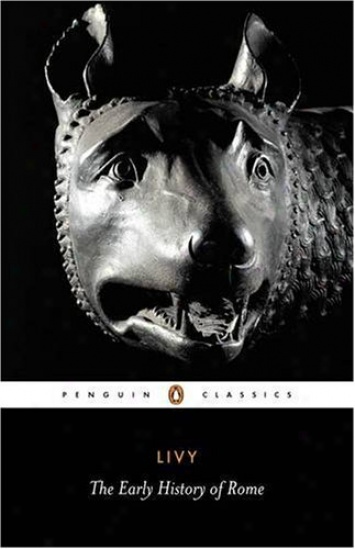 This great book isn’t part of the Great Books of Western Civilization, but it could be. I want my children and youth to see that I care about history, and I’ll look for opportunities to share Livy’s stories with them and talk about the connection between reading history and being successful leaders in life.
This great book isn’t part of the Great Books of Western Civilization, but it could be. I want my children and youth to see that I care about history, and I’ll look for opportunities to share Livy’s stories with them and talk about the connection between reading history and being successful leaders in life.
Rascal, by Chris Brady
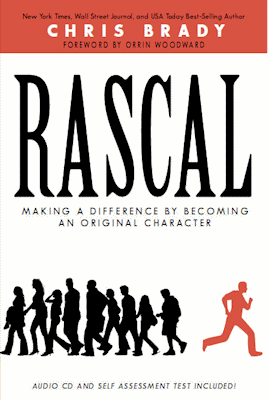 I want my kids to know what a “rascal” is–at least the way Brady defines it. I want them to be the kind of people this book promotes, and I can’t wait for them to ask me about this book.
I want my kids to know what a “rascal” is–at least the way Brady defines it. I want them to be the kind of people this book promotes, and I can’t wait for them to ask me about this book.
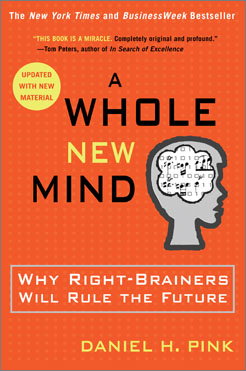 A Whole New Mind, by Daniel Pink
A Whole New Mind, by Daniel Pink
I want my youth to be innovative, creative, and have initiative. This is one of the hardest things to teach, but I’ll look for opportunities to discuss these things as I read this book.
Isaiah, in the Bible
I love sharing scriptural verses with the kids and discussing the meanings and lessons. It leads to a lot of important conversations with the kids about the most important topics.
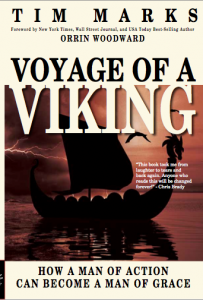 Voyage of a Viking, by Tim Marks
Voyage of a Viking, by Tim Marks
I can’t wait to talk to my kids and youth about this book! It’s about seeking for greatness, learning from your mistakes, not settling for mediocrity, and constantly improving yourself. I know the title of this book will have all my kids asking me questions about it!
Chillin’ and Grillin’
This week I’ve been reading these books in the evenings outside by the grill and the court where the kids play basketball, in the hot afternoons near the swamp cooler, and in the kitchen before meals and during cleanup after the family eats. I’ve taken turns with each book, so I’m a few chapters into all five of them, but I’ve had more than one discussion about each with the kids.
Tonight as dinner started, I got everyone’s attention and said, “I’m reading this awesome book. Actually, I’ve read it before but I’m re-reading it and I want to share something from it that really touched me.”
Everyone quieted down and listened. “Here goes,” I said. Then I read from Voyage of a Viking:
Kids can be pretty relentless in teasing one another, and the kids in my school were no different. I had never before been the subject of teasing and bullying, so it was a new experience for me. You see, news of my parents’ divorce got around town pretty quickly, and it wasn’t too long before the news hit my schoolyard.
The little kids in the family were leaning forward at full attention, and even the teens were paying close attention. I kept reading:
And then the teasing began. ‘There’s Tim, and he doesn’t have a dad,’ the kids would whisper to each other and taunt me.
I stopped reading and asked, “How would that make you feel?”
“I’d hate it!” Meri said forcefully. The other kids agreed.
After they shared their feelings, I asked, “Have you ever been teased like that?” We discussed this for a while, then I asked everyone, “Okay, I have another question. Have you ever teased anyone this way?”
“No way!” Meri exclaimed. She is nothing if not earnest.
“Are you sure?” I asked slowly.
Everyone considered. “Well, actually,” Meri said, then she told several stories of when she wasn’t very nice to people in her life. The other kids shared too, and we had a great conversation about being good friends and also standing up against bullying even when the victim isn’t your friend.
When I read what happened next in the book, everyone got even more interested. You’ve got to read it to get it! We spent dinner talking about this and discussing it.
At the end, I said, “I’m so excited to read the rest of this book.”
“Me too,” America said emphatically. “Meri” is nine years old, and she loves to read. I don’t know when she’ll read Voyage of a Viking, but I’ll be sharing from it and the others on my list all summer.
Actually, I’m having a hard time reading it because after our dinner discussion my visiting twenty-year old daughter Sara borrowed my copy and is reading it. Oh well, she reads fast. In the meantime, I’ve got the other four books.
Tomorrow at breakfast I’m planning to share the following quote from Livy, where he says that he is excited to write about Rome because, as he puts it:
I shall be able to turn my eyes from the troubles which for so long have tormented the modern world.
I’ll ask the family, “Why do you think people always feel that the modern, current world is so chaotic and hard and that the people in history somehow had things more simple? I mean, Livy thought this clear back in the time of Jesus Christ.”
This question is more for the teenagers, while yesterday’s conversation was perhaps more accessible to the younger kids. But everyone takes part in all of it. The older ones (me included!) bear reminding about Core Phase issues, and the younger ones benefit immensely by being including in the discussion of “serious” topics of academic and intellectual interest.
I could go on and on sharing examples of how to do this, but I’ve got a book calling to me. I’ve finished work for the day, and I want to read in the yard this evening—so I’ll be near the kids and we can talk.
Maybe I’ll teach them from one of these five books I’m reading, or maybe Meri will bring me a book of her own to read and talk about. Or perhaps we’ll all just sit in the warm evening and watch the sunset and talk. I often have the stack of all five books around with me, so I can just pick and choose which to read and share.
In any case, I’m excited to keep reading and sharing my book list this summer. This first week has been great. I can’t wait to see what we’ll learn about together in the months ahead.
Summer is a great time for education. So just get out your books, start reading, and share! The impact on freedom is huge.
Also check out Summer Reading for Kids >>
*Most of these books are available at your local library. Or, check the affiliate links to see amazon reviews, etc.
Category : Blog &Book Reviews &Business &Citizenship &Culture &Education &Family &Generations &Independents &Leadership &Liberty &Mission &Statesmanship
Wounded by School (book review)
June 14th, 2013 // 10:13 am @ Oliver DeMille
Another important book about freedom (and the lack of it) in modern education is Wounded by School by Kirsten Olson. It outlines the normal ways in which modern education hurts most children, shows the history of why schools adopt such harmful policies, and suggests real solutions.
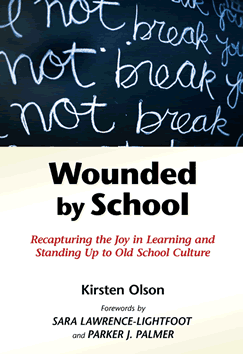 For example, Olson writes: “Many theorists suggest that the purpose of schools is to mold and shape individual self-concept so that pupils will accept a particular place in society…” Is this really what you want for your children?
For example, Olson writes: “Many theorists suggest that the purpose of schools is to mold and shape individual self-concept so that pupils will accept a particular place in society…” Is this really what you want for your children?
On a larger scale, what is the impact on freedom of raising a generation of youth to “accept a particular place in society”? This is a class system, pure and simple.
Olson points out that “Schools are deliberately designed to sort and track” students into order to promote the class system. Olson also suggests that among the key ways modern schools wound students are things like the following:
- I felt sick in school.
- I’m in the middle.
- I must comply.
- I can’t measure up.
- I am better than those below me.
- I must impress my superiors.
- What I want isn’t as important as what my betters want.
- Creativity must be secret—my focus must be conformity.
- Learning isn’t fun.
And for parents: “I feel helpless about saving my child,” and “The experts know what my kids need more than I do.”
Olson’s solutions center around bringing freedom back into schooling. Indeed, this is the focus of a lot of cutting-edge books and research on education.
Above all, we need to be clear about one thing: Freedom works. It does. Freedom is the best choice in society and also in education. If you are a parent or teacher, you have more power than you know. I highly recommend this book.
Category : Blog &Book Reviews &Culture &Education &Family &Leadership











